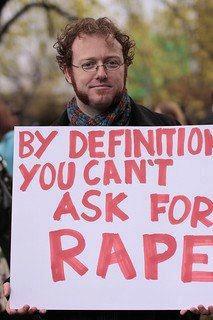Why Dress Codes for Girls Are Counterproductive and Misdirected
By:
A decade ago we weren't talking about "rape culture." Back then, it was a "family matter" as Vice President Biden recently stated when recollecting how people characterized intimate partner violence in the 1990's, or "the way of the world," as Rush Limbaugh more insidiously once conveyed. But somewhere along the line, women (and a few courageous men) began talking about how we, as a culture, unfairly perpetuate invalid and unacceptable stereotypes about rape survivors.
Shame is a big part of this. When a woman is raped, many people assume there is a reason for it. Rapists like to find excuses in a complex world for actions that aren't all that complex.It allows them to absolve themselves emotionally for unacceptable and inappropriate behavior. "She was dressed like she wanted it" is one excuse we hear. "She was flirting with me," or "she only said 'no' at first" are common too. "She was drunk" is another one you hear a lot. A lawyer that represented a University of Kansas student who raped a fellow student actually reasoned once that because the victim was on birth control she clearly expected to engage in sex, so his client (the rapist) was somehow not acting illegally.
Excuses for bad behavior help save a rapist from believing they are responsible personally, and all too often, legally. Yet curiously, this exemption of blame seldom overlooks child sex offenders. If someone is convicted of any sort of sexual act with a child, they are put on the sex offender list and aren't allowed within certain areas because the burden isn't on the child for talking to the predator, accepting candy, or playing on a playground. We never blame the child for taunting someone into unwanted activity. We don't blame children for what they wear. So why then do we blame victims of unwanted sexual contact based on their gender once they hit a certain age?
As a culture we've let this continue too long. Too many times, we still hear "she shouldn't have gone there," or "she shouldn't have been alone at a fraternity party," or "she shouldn't have been drinking," The insinuation? Women aren't supposed leave the house, much less go out with any man other than a close relative or chaperone, never drink alcohol, and dress plainly.
Have you ever wondered, however, where this need to put the burden on women begins in life? One place is a very simple one (that you probably haven't thought about): our schools.
All too often, young women must abide by outdated dress codes that put the burden of modesty on women, presuming men can't control themselves. Such was the case with a Montana woman who recently wrote (11 years later) about her high school experience of wearing a shirt that revealed her shoulders on the first day of classes. A teacher called her out, publicly humiliated her, and set her up for every young person's nightmare: being taunted, touched against her will, bullied, and called promiscuous names by her fellow students. Merely her shoulders.
"The rest of that year and the year following it, I spent in constant vigilance that I wasn’t going to be embarrassed for my clothing," she writes. "Talk about a productive 'learning environment'. At that time, the dean came into our classes and explained that the boys had a hard time paying attention when girls were showing skin."
This week, young female students and their male allies across the US have organized walkouts in objection to dress policies that put the burden and shame on women to dress conservatively, instead of teaching young men to respect women and that seeing them as sexual objects is wrong. The young women protesting have started using the hashtag #IAmMoreThanADistraction on Twitter.

Rancho Bernardo High School in California is still recovering after their former vice-principal (who was fired) did an "underwear check" before girls entered the spring prom. Young women were humiliated as they were forced to hike up their dresses and prove they weren't wearing thongs. It remains unclear how someone's underwear impacts the safety of a school.
The whole thing is outdated and sexist, and not just for women. If we use "boys will be boys" as an excuse for bad behavior, we are saying that we expect bad behavior out of men and boys. We are all human beings. Women deserve to live their lives in peace without being sexually objectified by men, and the sooner we teach that lesson by holding inappropriate behavior like cat calls, hyper-sexualizing, or bullying accountable, the better. Men and boys deserve more credit than being treated as Neanderthals who can't control themselves, focus, pay attention, or learn when they are around females.
